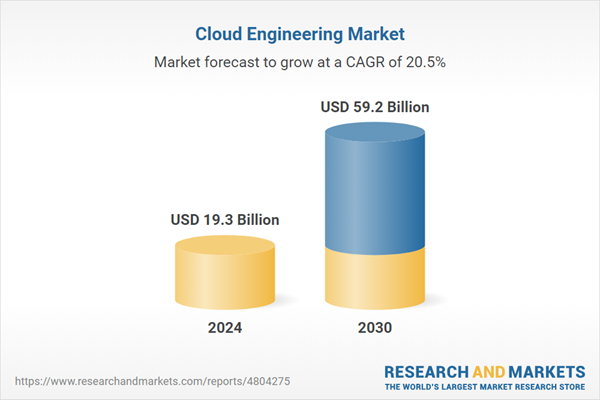Global Cloud Engineering Market - Key Trends and Drivers Summarized
Why Is Cloud Engineering Transforming the Digital Landscape?
Cloud engineering is revolutionizing the way businesses design, deploy, and manage their digital infrastructure, enabling organizations to harness the full power of cloud technologies. At its core, cloud engineering involves the application of engineering principles and practices to the cloud, optimizing the development, deployment, and operation of applications and services in cloud environments. This discipline encompasses cloud architecture, development, operations, and security, providing businesses with scalable, reliable, and cost-efficient solutions tailored to their unique needs. As companies increasingly migrate from traditional on-premises infrastructure to the cloud, cloud engineering offers the flexibility to build highly customized, cloud-native applications that can leverage the full benefits of cloud platforms such as Amazon Web Services (AWS), Microsoft Azure, and Google Cloud. Whether it's creating scalable microservices architectures, automating infrastructure through Infrastructure-as-Code (IaC), or integrating machine learning into cloud applications, cloud engineering is driving digital transformation across industries. By streamlining operations and reducing costs, cloud engineering allows businesses to innovate faster, respond to market demands more efficiently, and maintain a competitive edge in the digital age.How Are Technological Innovations Shaping Cloud Engineering?
Technological advancements are at the forefront of cloud engineering, making it easier for businesses to build, deploy, and manage complex cloud environments with greater efficiency and security. One of the most significant innovations is the widespread adoption of containerization technologies, such as Docker and Kubernetes, which have transformed how applications are developed, deployed, and scaled in cloud environments. Containers allow developers to package applications and their dependencies into portable units, ensuring that they run consistently across different cloud platforms. Additionally, serverless computing, which allows organizations to build and run applications without managing underlying infrastructure, has been a game-changer for cloud engineering. With serverless architectures, developers can focus on writing code while the cloud provider automatically handles scaling, patching, and maintenance, reducing operational overhead and improving agility. Another key innovation is the increased use of Infrastructure-as-Code (IaC), which enables engineers to automate the provisioning and management of cloud resources through code, leading to faster deployments, better resource management, and reduced human error. Furthermore, advancements in AI and machine learning are being integrated into cloud engineering processes, enhancing capabilities such as predictive maintenance, resource optimization, and intelligent automation. These technologies are reshaping the cloud engineering landscape, empowering businesses to build smarter, more resilient cloud infrastructures that can scale dynamically to meet growing demands.Where Is Cloud Engineering Making the Biggest Impact?
Cloud engineering is making a profound impact across a wide range of industries, transforming how businesses design, deploy, and manage their IT infrastructures. In the financial services industry, cloud engineering is enabling banks and financial institutions to move critical applications to the cloud while ensuring security, compliance, and scalability. Cloud-based solutions, designed by cloud engineers, allow financial institutions to handle high volumes of transactions, integrate AI-driven risk management tools, and enhance customer experiences through personalized services. In healthcare, cloud engineering is facilitating the shift toward cloud-native applications that support telemedicine, electronic health records (EHRs), and AI-powered diagnostics. By leveraging cloud technologies, healthcare organizations can process and store massive amounts of patient data securely while ensuring compliance with regulations such as HIPAA. In the retail and e-commerce sectors, cloud engineering plays a crucial role in optimizing supply chain management, enabling real-time inventory tracking, and delivering personalized shopping experiences. These industries rely on cloud engineers to build scalable cloud architectures that can handle seasonal traffic spikes and data-intensive operations. The technology sector itself is driven by cloud engineering, where companies use advanced cloud architectures to deploy software products, integrate continuous integration and continuous delivery (CI/CD) pipelines, and ensure uptime for critical services. Across these industries, cloud engineering is helping organizations streamline operations, enhance agility, and deliver innovative services to meet evolving market demands.What Is Driving the Growth of the Cloud Engineering Market?
The growth in the cloud engineering market is driven by several key factors, primarily the increasing demand for cloud migration and digital transformation initiatives across industries. As businesses recognize the benefits of moving to cloud environments - such as scalability, flexibility, and cost-efficiency - the need for skilled cloud engineers to design, implement, and maintain cloud infrastructures is growing rapidly. One significant driver is the shift towards multi-cloud and hybrid cloud strategies, where businesses utilize a combination of private and public clouds to meet their unique needs. Cloud engineers are essential in orchestrating these complex environments, ensuring seamless integration and optimized performance. The rise of DevOps and the growing adoption of automation in cloud operations is also fueling the demand for cloud engineering. With tools like Infrastructure-as-Code (IaC) and container orchestration platforms, cloud engineers are automating repetitive tasks, improving deployment speed, and reducing human error. The increasing use of artificial intelligence (AI) and machine learning (ML) in cloud applications is another driver of growth, as cloud engineers are tasked with integrating these advanced technologies into scalable cloud infrastructures. Additionally, the ongoing emphasis on cybersecurity, especially in industries like healthcare, finance, and government, is driving demand for cloud engineers who can design secure cloud architectures and implement stringent security protocols. These factors, combined with the global acceleration of remote work and the need for flexible, scalable cloud solutions, are fueling the rapid expansion of the cloud engineering market, as businesses invest in robust cloud strategies to stay competitive in the digital era.Report Scope
The report analyzes the Cloud Engineering market, presented in terms of market value (USD). The analysis covers the key segments and geographic regions outlined below.- Segments: Segment (Public Cloud, Private Cloud, Hybrid Cloud); Organization Size (SMEs, Large Enterprises).
- Geographic Regions/Countries: World; United States; Canada; Japan; China; Europe (France; Germany; Italy; United Kingdom; and Rest of Europe); Asia-Pacific; Rest of World.
Key Insights:
- Market Growth: Understand the significant growth trajectory of the SMEs segment, which is expected to reach US$32.4 Billion by 2030 with a CAGR of 18.7%. The Large Enterprises segment is also set to grow at 23% CAGR over the analysis period.
- Regional Analysis: Gain insights into the U.S. market, valued at $5.3 Billion in 2024, and China, forecasted to grow at an impressive 19.5% CAGR to reach $9 Billion by 2030. Discover growth trends in other key regions, including Japan, Canada, Germany, and the Asia-Pacific.
Why You Should Buy This Report:
- Detailed Market Analysis: Access a thorough analysis of the Global Cloud Engineering Market, covering all major geographic regions and market segments.
- Competitive Insights: Get an overview of the competitive landscape, including the market presence of major players across different geographies.
- Future Trends and Drivers: Understand the key trends and drivers shaping the future of the Global Cloud Engineering Market.
- Actionable Insights: Benefit from actionable insights that can help you identify new revenue opportunities and make strategic business decisions.
Key Questions Answered:
- How is the Global Cloud Engineering Market expected to evolve by 2030?
- What are the main drivers and restraints affecting the market?
- Which market segments will grow the most over the forecast period?
- How will market shares for different regions and segments change by 2030?
- Who are the leading players in the market, and what are their prospects?
Report Features:
- Comprehensive Market Data: Independent analysis of annual sales and market forecasts in US$ Million from 2024 to 2030.
- In-Depth Regional Analysis: Detailed insights into key markets, including the U.S., China, Japan, Canada, Europe, Asia-Pacific, Latin America, Middle East, and Africa.
- Company Profiles: Coverage of players such as Aricent, Inc., Calsoft Inc., Engineering Ingegneria Informatica S.p.A., Infosys Ltd., ITC Infotech India Ltd. and more.
- Complimentary Updates: Receive free report updates for one year to keep you informed of the latest market developments.
Some of the 17 companies featured in this Cloud Engineering market report include:
- Aricent, Inc.
- Calsoft Inc.
- Engineering Ingegneria Informatica S.p.A.
- Infosys Ltd.
- ITC Infotech India Ltd.
- Nitorco USA
- RapidValue Solutions
- Searce Inc.
- Trianz, Inc.
- VVDN Technologies
This edition integrates the latest global trade and economic shifts into comprehensive market analysis. Key updates include:
- Tariff and Trade Impact: Insights into global tariff negotiations across 180+ countries, with analysis of supply chain turbulence, sourcing disruptions, and geographic realignment. Special focus on 2025 as a pivotal year for trade tensions, including updated perspectives on the Trump-era tariffs.
- Adjusted Forecasts and Analytics: Revised global and regional market forecasts through 2030, incorporating tariff effects, economic uncertainty, and structural changes in globalization. Includes historical analysis from 2015 to 2023.
- Strategic Market Dynamics: Evaluation of revised market prospects, regional outlooks, and key economic indicators such as population and urbanization trends.
- Innovation & Technology Trends: Latest developments in product and process innovation, emerging technologies, and key industry drivers shaping the competitive landscape.
- Competitive Intelligence: Updated global market share estimates for 2025, competitive positioning of major players (Strong/Active/Niche/Trivial), and refined focus on leading global brands and core players.
- Expert Insight & Commentary: Strategic analysis from economists, trade experts, and domain specialists to contextualize market shifts and identify emerging opportunities.
Table of Contents
Companies Mentioned (Partial List)
A selection of companies mentioned in this report includes, but is not limited to:
- Aricent, Inc.
- Calsoft Inc.
- Engineering Ingegneria Informatica S.p.A.
- Infosys Ltd.
- ITC Infotech India Ltd.
- Nitorco USA
- RapidValue Solutions
- Searce Inc.
- Trianz, Inc.
- VVDN Technologies
Table Information
| Report Attribute | Details |
|---|---|
| No. of Pages | 263 |
| Published | January 2026 |
| Forecast Period | 2024 - 2030 |
| Estimated Market Value ( USD | $ 19.3 Billion |
| Forecasted Market Value ( USD | $ 59.2 Billion |
| Compound Annual Growth Rate | 20.5% |
| Regions Covered | Global |









